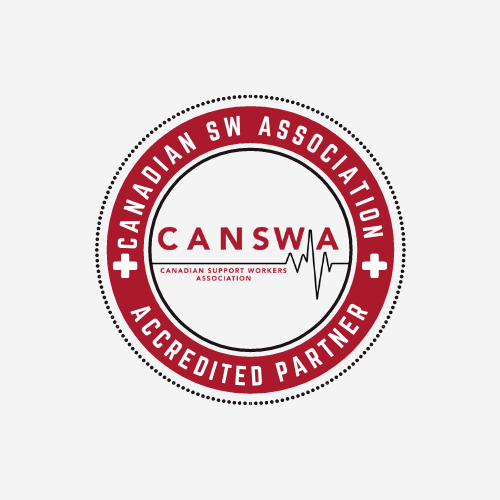The Personal Support Worker (PSW) program prepares you to provide supportive care for individuals in a variety of settings. As a PSW, you’ll work with people who have a range of health challenges. By assisting people with daily activities, you’ll enable them to live more independent and fulfilling lives.


The Canadian Support Workers Association recognizes and fully endorses the PSW curriculum of Booth University College.
Overview
The Personal Support Worker program can be completed in:
- 1 to 2 years
For students enrolled full-time, our program takes 8 months to complete courses and about 2 months to complete the practicum.
This program is delivered entirely online, except for the field hours in the practicum course. The certificate follows a cohort structure. Students begin and complete the required and elective courses together.
The PSW program provides an integrated experience where students learn in both academic and workplace contexts. Unique to our program is the spiritual care component which is embedded in the course work. This includes spiritual care practices and procedures, and their context in a multicultural, multifaith society. The IRCM is a theoretical and applied approach to training. With the use of technology, patients can recover in the comfort of their homes with the assurance that their needs are being monitored and responded to with short wait times.
Upon completion, graduates are expected to provide supportive care in an ethical, wholistic, person-centred, and safe manner. You’ll use effective written and oral communication skills to work with clients, their families and an interprofessional team.
Work settings may include personal care homes, retirement homes, private homes, and long-term care homes.
What You'll Learn
Here’s what you can expect to learn in this program, in addition to our Institutional Learning Outcomes:
- Work within the personal support worker role in various care settings following all applicable legislation, standards, employer job descriptions, policies, procedures, and guidelines.
- Practice professionally and be accountable for one's own actions by applying problem-solving, self-awareness, time management, and critical thinking to the provision of care as a personal support worker, whether working independently or as a member of a team.
- Practice as an engaged member of the interprofessional team to maintain collaborative working relationships for providing supportive, safe, responsive, and competent client-centred care within care settings.
- Provide person-centred care, based on ethical principles, sensitive to diverse personal and family values, beliefs, cultural practices, and other needs, which follows the plan of care.
- Establish and maintain therapeutic relationships with clients and their families using effective communication skills to build a genuine, trusting, and respectful partnership, following professional boundaries, employer policies, confidentiality, and privacy legislation.
- Identify relevant client information within the roles and responsibilities of the personal support worker using observation, critical thinking, and effective communication skills to report and document findings.
- Create, promote, and maintain a safe and comfortable environment for clients, their families, self, and others by implementing current infection prevention and control measures, emergency and first aid procedures, and best practices in pandemic planning that are in keeping with the plan of care, all applicable legislation, and employer policies and procedures.
- Assist clients across the lifespan with activities of daily living by applying fundamental knowledge of growth and development, psychological concepts, common alterations in functioning, health promotion, disease prevention, rehabilitation and restorative care, and holistic health care.
- Assist the client with medication following the client's plan of care, and if a delegated act, under the supervision of a regulated health professional or done by an exception under the most accountable person and by all applicable legislation and employer policies.
- Assist with household management services and instrumental activities of daily living by the plan of care and considering the preferences, comfort, safety and autonomy of clients, families, and significant others.
- Assist and support clients who are caregivers, considering individual and family choices, professional boundaries, and the direction of the plan of care.
- Identify, respond to and report potential, alleged, suspected, or witnessed situations of abuse, and/or neglect, as required by all applicable legislation, including regulations under the Manitoba Health Services Insurance Act of 2024, and as required within the employers' job description for the personal support workers.
- Assist with providing holistic health care and advocacy for culturally safe and spiritually sensitive palliative and end-of-life care to clients and their families and significant others from diagnosis through to death and bereavement, and following clients’ choices and the plan of care.
- Provide client-centred and client-directed care to individuals experiencing various mental health illnesses and challenges, cognitive and intellectual impairments, and/or responsive behaviours by using supportive approaches and evidence-based practices to promote positive and safe behaviours in clients.
Program Requirements
- 12 required courses
- Practicum
- Integrated Remote Care Management (IRCM) Seminar
Required Courses
- Principles of Person-Centred Care
- Writing for the Workplace
- Workplace Health and Safety for the Personal Support Worker
- Ethics of Person-Centred Care
- Communication Skills for Healthcare
- Person-Centred Activities of Daily Living
- Rehabilitative and Restorative Care
- Household Management
- Mental Health and Dementia Care
- Palliative And End of Life Care
- Personal Support Workers As Part of an Interprofessional Team
- Personal Support Worker Practicum Preparation
- Student Practicum
- IRCM Workshop: 3 days
Tuition and Fees
Under Review
Admission Requirements
Review the admission requirements for this program, plus specific details for mature students, international students, and high school equivalencies for applicants outside Manitoba.
Contact Us
Our Admissions Team is happy to provide more information or help you through the application process. Contact us if you'd like to learn more about Booth University College or any of our programs.




